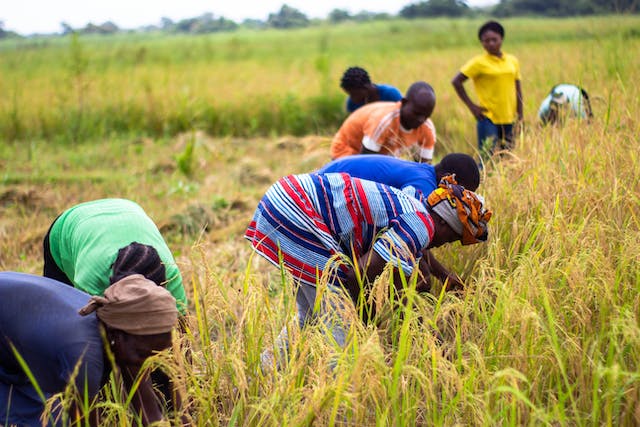Agriculture remains one of the most promising sectors in Nigeria for wealth creation, employment, and food security. With a growing population and increasing demand for food and raw materials, the opportunity to start a profitable farming business has never been better.
Whether you’re an aspiring agripreneur or an existing farmer looking to scale, this guide explores top farming business ideas in Nigeria that are not only profitable but also scalable in 2025 and beyond.
If you run an agribusiness or plan to, it’s also important to organize your payments and invoices professionally. Sign up on ProInvoice to send clean, branded invoices for free — ideal for agro suppliers, farm consultants, and produce merchants.
Let’s explore the best ideas to kick-start your farming journey.
1. Poultry Farming
Poultry farming is one of the most common agribusiness ventures in Nigeria—and for good reason. With consistent demand for eggs and chicken meat, it offers a fast return on investment.
Opportunities include:
- Broiler production (for meat)
- Layer farming (for eggs)
- Hatchery services
- Poultry feed production
Even small-scale operations can grow quickly with proper management and a steady market.
2. Fish Farming (Aquaculture)
Fish farming, especially catfish and tilapia production, is growing rapidly. Nigerians consume over 3 million metric tonnes of fish annually, creating a solid market for local producers.
Types of fish farming:
- Concrete or tarpaulin ponds
- Earthen ponds
- Recirculating aquaculture systems (RAS)
With good water management and feeding techniques, fish farming can yield high profits in 6–8 months.
3. Snail Farming
Snail farming (heliciculture) is one of the most underrated but highly lucrative agribusinesses. It requires low startup capital, minimal space, and has a growing demand in hotels, restaurants, and export markets.
Popular species:
- Archachatina marginata (giant African land snail)
Snails reproduce rapidly and are easy to maintain, making it a low-risk investment for beginners.
4. Cassava Farming
Nigeria is the largest producer of cassava in the world. Cassava is used in many Nigerian staple foods like garri, fufu, starch, and flour, making it an evergreen crop.
Cassava products in high demand:
- Garri
- Cassava flour
- Starch
- Animal feed
With improved varieties and processing options, cassava farming is both scalable and exportable.
5. Vegetable Farming
Urban and peri-urban vegetable farming is gaining popularity. Crops like ugu (fluted pumpkin), spinach, scent leaf, lettuce, and cabbage are in high demand in homes, hotels, and food markets.
Advantages:
- Quick growth cycle (30–90 days)
- Year-round cultivation
- High ROI in small spaces
You can also use greenhouse farming to scale or extend seasons.
6. Goat Rearing
Goat meat is a staple in many Nigerian households and ceremonies. Rearing goats for meat, milk, or breeding stock offers great returns, especially during festive seasons.
Breeds to consider:
- West African Dwarf
- Boer goat (for meat)
- Sahel goat
Goat farming is relatively low maintenance and ideal for rural and semi-urban areas.
7. Maize Farming
Maize is one of Nigeria’s most important staple crops. It serves both human consumption and industrial uses like feed production, flour, and ethanol.
Maize farming tips:
- Cultivate during the rainy season (April–October)
- Use improved seeds
- Target large-scale buyers like flour mills and poultry feed producers
8. Pig Farming
Pig farming has a high-profit margin due to pigs’ rapid growth and reproduction rates. A well-fed pig can weigh over 100kg in six months.
Why pig farming is lucrative:
- Pigs are prolific breeders
- High demand for pork in cities
- Strong market in hotels and eateries
However, it requires good hygiene, disease control, and proper waste management.
9. Rice Farming
Nigeria is one of Africa’s largest consumers of rice. With government support and increasing demand, rice farming presents a huge opportunity.
Profit drivers:
- Cultivating improved rice varieties
- Engaging in processing (rice milling)
- Supplying to major retailers and wholesalers
You can also explore value chains like rice packaging and branding.
10. Beekeeping (Apiculture)
Beekeeping is a lesser-known agribusiness but offers diverse income streams from honey, beeswax, royal jelly, and pollination services.
Benefits:
- Minimal space and maintenance
- High-value product (organic honey)
- Eco-friendly farming
Selling well-packaged, organic honey has a strong niche market in Nigeria and abroad.
11. Mushroom Farming
Mushroom cultivation is another high-demand, high-value farming idea. With growing interest in healthy eating, mushrooms are being adopted more widely in homes and restaurants.
Ideal mushrooms to farm:
- Oyster mushrooms
- Shiitake
- Button mushrooms
It requires low space and startup capital but high attention to hygiene and temperature control.
12. Oil Palm Farming
Oil palm is a major cash crop in Nigeria. From palm oil to palm kernel and soap production, this business has a long shelf life and consistent demand.
Pros:
- Can last decades once established
- High market demand (local and export)
- Useful for both food and cosmetic industries
Although capital-intensive at the start, oil palm farming becomes a goldmine over time.
13. Plantain Farming
Plantain is a staple food crop in Nigeria with year-round demand. It grows well in tropical climates, especially in the southern regions.
Benefits:
- High market value
- Suitable for intercropping with vegetables
- Early yield (within 8–10 months)
You can also add value by producing plantain chips or flour.
14. Cucumber Farming
Cucumber is fast-growing and highly profitable. With a maturity cycle of just 45–60 days, you can generate returns multiple times a year.
Market demand:
- Salads, fruit drinks, and wellness markets
- Urban food vendors and supermarkets
Greenhouse or open-field systems are both viable depending on your capital.
15. Livestock Feed Production
If you’re not directly interested in crop or animal farming, consider livestock feed production. With the rise in poultry, fish, and livestock farming, feed is always in high demand.
Common feeds:
- Poultry mash
- Catfish feed
- Goat and cattle meal
This business supports other agribusinesses and has strong supply chain potential.
Why You Should Consider Farming in Nigeria
- Massive market: With over 200 million people, Nigeria has a large and growing demand for food.
- Government support: Through programs like NIRSAL, Anchor Borrowers Program, and agric grants.
- Diverse climate: Different regions support various types of crops and livestock.
- Export potential: Africa and global markets are opening up to Nigerian agro-products.
To run a successful farming business, you also need to manage finances and billing properly—especially if you’re supplying to stores, institutions, or individuals. Tools like ProInvoice help farmers, agro-traders, and consultants issue free, branded invoices professionally.
Conclusion
The opportunities in Nigerian agribusiness are vast and largely untapped. From crops to animal farming, processing, and value-added products, there’s room for everyone to profit — even with modest capital.
Whichever idea you decide to explore, ensure you start small, learn as you grow, and build structures for sustainability. And remember, proper invoicing builds trust. Whether you’re supplying cassava, eggs, honey, or palm oil, use ProInvoice to send branded invoices, track payments, and grow your farming business with credibility.













